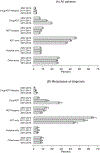Patterns of Care for Medicare Beneficiaries With Metastatic Prostate Cancer
- PMID: 38640419
- PMCID: PMC11135654
- DOI: 10.1097/UPJ.0000000000000557
Patterns of Care for Medicare Beneficiaries With Metastatic Prostate Cancer
Abstract
Introduction: Therapeutic options for men with metastatic prostate cancer have increased in the past decade. We studied recent treatment patterns for men with metastatic prostate cancer and how treatment patterns have changed over time.
Methods: Using the Surveillance, Epidemiology, and End Results‒Medicare database, we identified fee-for-service Medicare beneficiaries who either were diagnosed with metastatic prostate cancer or developed metastases following diagnosis, as indicated by the presence of claims with diagnoses codes for metastatic disease, between 2007 and 2017. We evaluated treatment patterns using claims.
Results: We identified 29,800 men with metastatic disease, of whom 4721 (18.8%) had metastatic disease at their initial diagnosis. The mean age was 77 years, and 77.9% of patients were non-Hispanic White. The proportion receiving antineoplastic agents within 3 years of the index date increased over time (from 9.7% in 2007 to 25.9% in 2017; P < .001). Opioid use within 3 years of prostate cancer diagnosis was stable during 2007 to 2013 (around 73%) but decreased through 2017 to 65.5% (P < .001). Patients diagnosed during 2015 to 2017 had longer median survival (32.6 months) compared to those diagnosed during 2007 to 2010 (26.6 months; P < .001).
Conclusions: Most metastatic prostate cancer patients do not receive life-prolonging antineoplastic therapies. Improved adoption of effective cancer therapies when appropriate may increase length and quality of survival among metastatic prostate cancer patients.
Keywords: SEER-Medicare; antineoplastic therapy; metastasis; physicians’ practice patterns; prostate cancer.
Conflict of interest statement
Figures





References
-
- Howard DH, Quek RGW, Fox KM, Arondekar B, Filson CP. The value of new drugs for advanced prostate cancer. Cancer. 2021;127(18):3457–3465. - PubMed
-
- Nordstrom BL, Whyte JL, Stolar M, Mercaldi C, Kallich JD. Identification of metastatic cancer in claims data. Pharmacoepidemiol Drug Saf 2012;21(suppl 2):21–28. - PubMed
-
- Olsen TA, Filson CP, Richards TB, Ekwueme DU, Howard DH. The cost of metastatic prostate cancer in the United States. Urol Pract 2023;10(1):41–47. - PubMed
-
- 2020 CDC opioid NDC and oral MME conversion file. Centers for Disease Control and Prevention. Accessed October 2, 2023. https://www.cdc.gov/opioids/data-resources/index.html
-
- George DJ, Sartor O, Miller K, et al. Treatment patterns and outcomes in patients with metastatic castration-resistant prostate cancer in a real-world clinical practice setting in the United States. Clin Genitourin Cancer. 2020;18(4):284–294. - PubMed
Publication types
MeSH terms
Substances
Grants and funding
LinkOut - more resources
Full Text Sources
Medical
Miscellaneous

